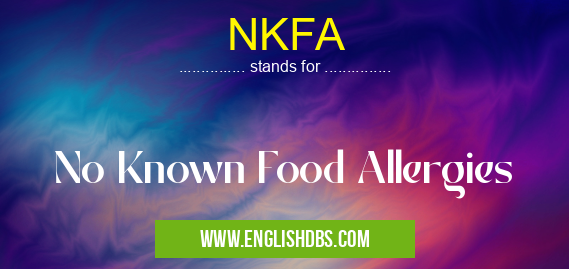What does NKFA mean in HOSPITALS
No Known Food Allergies (NKFA) is a term that is used to describe someone who does not have any known food allergies or dietary restrictions. It is important to understand this label in order to avoid any potential allergy-related risks.

NKFA meaning in Hospitals in Medical
NKFA mostly used in an acronym Hospitals in Category Medical that means No Known Food Allergies
Shorthand: NKFA,
Full Form: No Known Food Allergies
For more information of "No Known Food Allergies", see the section below.
Essential Questions and Answers on No Known Food Allergies in "MEDICAL»HOSP"
What Does NKFA Mean?
NKFA stands for "No Known Food Allergies." It is a term used to describe someone who does not have any known food allergies or dietary restrictions.
Who Should Have an NKFA Label?
People who do not have known allergies are the ones who should use the label "No Known Food Allergies" (NKFA). This includes people without any type of diagnosis, such as an immune system disorder causing their allergic reactions.
How Can I Tell If Someone Has NKFA?
There is no definitive way to tell if someone has "No Known Food Allergies" (NKFA). The best way to find out whether or not someone has any known food allergies or other dietary restrictions is by asking them directly whether they have any.
Are There Any Risks For People With NKFA?
Even though "No Known Food Allergies" (NKFA) means that someone does not have a diagnosis of any type of allergy, there are still some potential risks associated with eating certain foods. People should always be aware of potential allergy triggers and take precautions when consuming unfamiliar foods or in new environments, such as foreign countries where allergies may be more common.
What Steps Should Be Taken To Ensure Safety With Foods For Those With NKFA?
People who claim "No Known Food Allergies" (NKFA) should follow some basic safety guidelines when eating unfamiliar foods. They should read ingredients lists carefully and ask questions about ingredients and preparation methods at restaurants before ordering a meal. They should also be aware of cross- contamination from sharing food with others and storing it correctly in the home. These steps will help to reduce the chances of having an allergic reaction even without having a diagnosed allergy condition.
